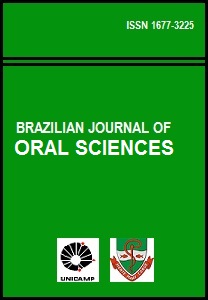Abstract
The aim of this study was to evaluate the effects of different coffee solutions on Streptococcus mutans adherence to human dental enamel and dentine. Seventy-five specimens of human enamel and 75 of dentine were included in the study. Coffee solutions were prepared with two different trade marks of coffee (Mellita® and Pilão®) and two methods of preparation. The specimens were divided into ten experimental groups (n=15) according to the coffee solution tested. Each specimen was transferred to cell culture plates containing offee solution and culture medium and 0.1 ml of Streptococcus mutans standardized suspension was inoculated into each well. After the period of incubation, the number of bacterial cells adhered to each specimen was obtained by plating method. Results were analyzed by ANOVA and Tukey’s test (5%). Results showed that Streptococcus mutans adherence was statistically lower in the presence of the solution obtained by boiling method and the trade mark Pilão® (p=0.00) when compared with the other groups. All the test-groups presented values of cfu/ml significantly lower in relation to the control groups (p=0.00). It could be concluded, within the conditions of the study, that the coffee solutions tested reduced significantly the adherence of Streptococcus to dental enamel and dentineReferences
Featherstone JDB. The science and practice of caries prevention. J Am Dent Assoc. 2000; 131: 887-99.
Daglia M, Papetti A, Dacarro C, Gazzani G. Isolation of antibacterial component from roasted coffee. J Pharm Bio An. 1998; 18: 219-25 3. Linke HA, Le Geros RZ. Black tea extract and dental caries formation in hamsters. Int J Food Sci Nutr. 2003; 54: 89-95.
Matsumoto M, Hamada S, Ooshima T. Molecular análisis of the inhibitory effects of oolong tea polyphenols on glucanbinding domain of recombinant glucosyltransferases from Streptococcus mutans MT8148. FEMS Microbiol Lett. 2003; 228: 73-80.
Matsumoto M, Minami T, Sasaki H, Sobue S, Hamada S, Ooshima T. Inhibitory effects of oolong tea extract on caries – inducing properties of Mutans streptococci. Caries Res. 1999; 33: 441-5.
Ooshima T, Osaka Y, Sasaki H, Osawa K, Yasuda H, Matsumura M, Sobue S, Matsumoto M. Caries inhibitory activity of cacao bean husk extract in in vitro and animal experiments. Arch Oral Biol. 2000; 45: 639-45.
Otake S, Makimura M, Kuroki T, Nishihara Y, Hirasawa M. Anticaries effects of polyphenolic compunds from japanese green tea. Caries Res. 1991; 25: 438-43.
Sasaki H, Matsumoto M, Tanaka T, Maeda M, Nakai M, Hamada S, Ooshima T. Antibacterial activity of polyphenol components in oolong tea extract against Streptococcus mutans. Caries Res. 2004; 38: 2-8.
Limsong J, Benjavongkulchai E, Kuvatanasuchati J. Inhibitory effect of some herbal extracts on adherence of Streptococcus mutans. J Ethnopharmacol. 2004; 92: 281-9.
Kashket S, Paolino VJ, Lewis DA, Van Houte J. In vitro inhibition of glucosyltransferase from the dental plaque bacterium Streptococcus mutans by commons beverages and food extracts. Arch Oral Biol. 1985; 30: 821-6.
Lima DR. Café e Saude: Manual de Farmacología Clínica, Terapêutica e Toxicologia. 3.ed. Rio de Janeiro: Medsi; 2003. p.141-9.
Toda M. The bactericidal activity of tea and coffe. Lett Appl Microbiol. 1989; 8: 123-5.
Kashket S, Paolino VJ, Lewis D, VanHoute J. Glucosyltransferase inhibition by tannin-like constituents of beverages. J Dent Res. 1985; 64: 212.
Landucci LF, Oliveira LD, Brandão EHS, Koga-Ito CY, GaettiJardim Jr E, Jorge AOC. Efeitos de Coffea arabica sobre a aderência de Streptococcus mutans à superfície de vidro. Cienc Odontol Bras. 2003; 6: 58-64.
Camargo MCR, Toledo MCF. Teor de cafeína em cafés brasileiros. Ciênc Tecnol Aliment. 1998; 18: 421-4.
Brandão EHS, Landucci LF, Oliveira LD, Koga-Ito CY, Jorge AOC. Antimicrobial activity of coffee-based solutions and their effect on Streptococcus mutans adherence. Braz J Oral Sci.
; 6: 1274-7.
Daglia M, Tarsi R, Papetti A, Grisoli P, Dacarro C, Pruzzo C et al. Antiadhesive effect of green and roasted coffee on Streptococcus mutans’ adhesive properties on saliva-coated hydroxyapatite beads. J Agric Food Chem. 2002; 50: 1225-9.
Paolino VJ, Kashket S, Sparagna CA. Inhibition of dextran synthesis by tannic acid. J Dent Res. 1980; 59: 389.
Osawa K, Miyazaki K, Shimura S, Okuda J, Matsumoto M, Ooshima T. Identification of cariostatic substances in the cacao bean husk: their anti-glucosyltransferase and antibacterial activities. J Dent Res. 2001; 80: 2000-4.
The Brazilian Journal of Oral Sciences uses the Creative Commons license (CC), thus preserving the integrity of the articles in an open access environment.


